Farah Al Shami, Senior Fellow and Social Protection
Program Director at the Arab Reform Initiative (ARI)
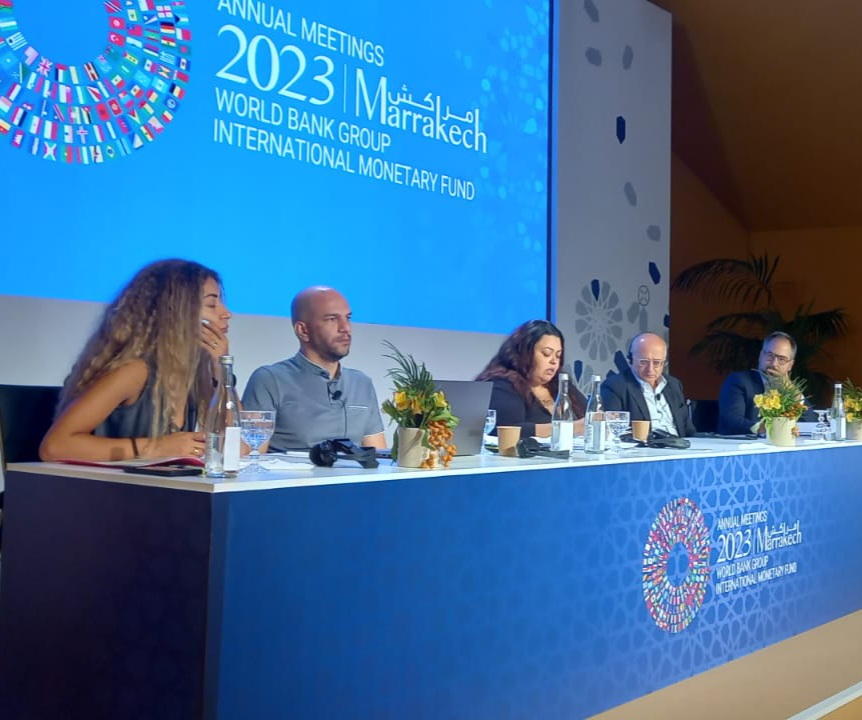
While global attention was riveted on the war waged by Israel on Gaza and its escalating repercussions in October 2023, pivotal decisions concerning global economies, people’s livelihoods and wellbeing, environmental sustainability, and the future of nations were underway during the Annual Meetings of the International Monetary Fund (IMF) and World Bank Group (WBG) in Marrakech, Morocco. As Annual Meetings take place beyond the confines of Washington DC, in a country of the global South, only every third year, the world’s civil society’s efforts had been geared towards these meetings and specific attention during preparations had been paid to the Arab region, being the host for the year. “The road to Marrakech” made the slogan of the momentum built in readiness for the meetings’ moment.
Civil Society Organizations (CSOs), activists, and researchers equipped themselves with evidence-based research and research by-products. They planned series of events, including panel discussions at the meetings’ Civil Society Policy Forum (CSPF) and side events as part of the counter, parallel, or alternative summits, or even independently. They organized themselves in campaigns, engaged in preparatory discussions, coordinated their messaging, published joint statements and press releases, collectively sent personalized letters to IMF and WBG executive directors, and arranged for bilateral meetings with some representatives of the international financial institutions (IFIs)… They joined forces to act as a critical mass, voicing out their demands for inclusive economies, equitable development paradigms, social and economic justice, environmental justice, and gender justice.
The Arab Reform Initiative (ARI) and its partners, alone, ran an extensive campaign, in the framework of the Global Campaign for the Right to Social Security. In addition to the wealth of knowledge and ensuing advocacy materials they had produced, they went to Marrakech with an exhaustive calendar of events, three of which were mainly led by ARI: a session at the CSPF titled “Financing Universal Social Protection Systems in the Arab Region: What alternatives to debt and austerity?”; a session at the Reclaim Our Future Conference (part of the counter-summit) titled “IFIs, Climate Finance, and Social Spending: The missed opportunity!”; and an independent side event titled “The Impact of IFIs on Social Protection in the Arab Region.”
Our participation in the Marrakech meetings, exchanges[1] with a large number of CSOs, and detailed articles about civil society’s experience in these meetings, such as the one published by Meshkal, suggest that CSOs’ concerted efforts were met by the organizers with supremacy, exclusion, and perfunctoriness. With the Spring Meetings-2024 happening in two weeks in DC, it is imperative to reflect on the experience from Marrakech, drawing on lessons learned and best practices for the coming meetings and beyond.
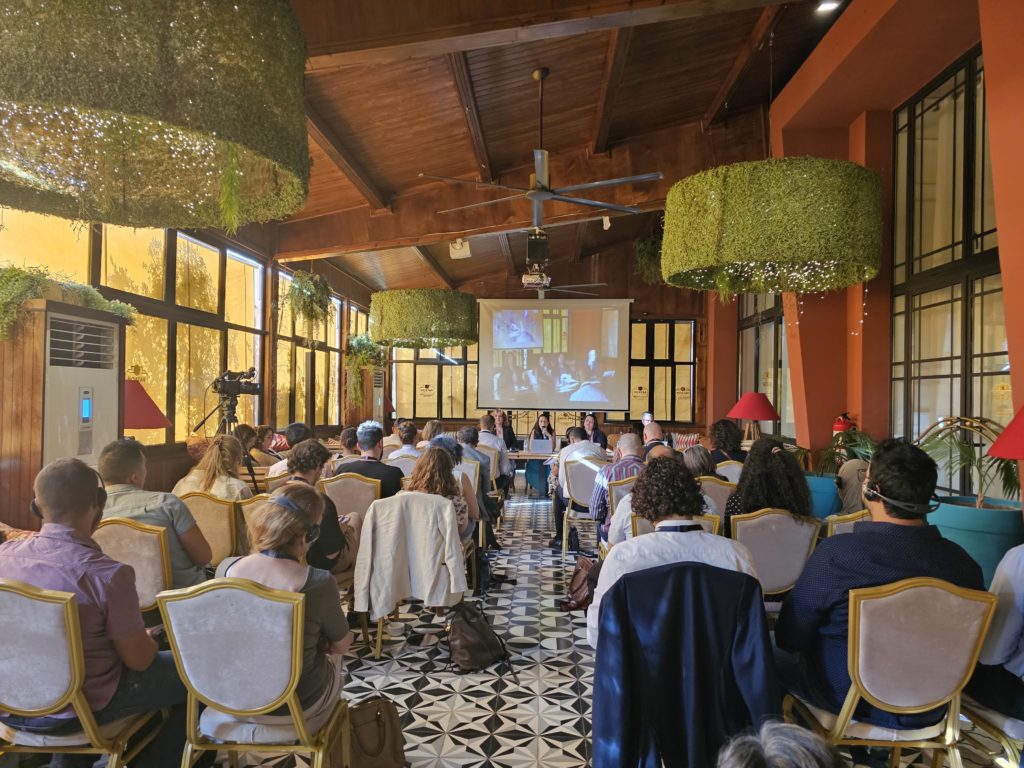
Perfunctoriness and Lack of Political Will to Change
In Marrakech, CSOs found themselves victims of a ‘CSO washing’ and ‘box-checking’ strategy by the IMF and the WBG. In return for their assiduous preparations, they struggled to secure representatives of either IFI as speakers on their different panels. It was also difficult for them to arrange one-on-one discussions with these representatives during the meetings, in the meetings’ campus. In many cases where the IMF-WBG Civil Society Team succeeded in helping secure speakers from the IFIs’ side, the speakers did not show-up, rendering the events’ organizers helpless on the spot. These events take time and effort to conceptualize and organize, and are meant to share and discuss CSOs’ latest research findings with IMF/WBG representatives as well as deliver key advocacy messages to them. Encounters of this kind transformed such attempts into intra-CSO discussions, whereas CSOs always meet and discuss amongst each other and do not need to travel all the way to Annual Meetings and the CSPF to do so.
In most cases, the speakers secured by the CSO Team were country representatives who are not involved in negotiations between the technical teams and the governments, without any guarantee that they would convey the discussions’ outcomes to the right decision maker. In many other instances, the designated speaker is not in charge of the dossier tackled at the event, thus deferring the prerogative and responsibility to address raised issues to their colleagues during the event – also with no assurance that they would actually relay the discussions’ takeaway ex-post. In addition, some IMF or WBG speakers used the same presentations they had used in previous Annual and Spring Meetings.
In these panel discussions, in whatever bilateral meetings that could be scheduled, and even in closed meetings with senior officials or town halls with the top management, the IMF and the WBG came with pre-prepared interventions or presentations that are perfectly aligned with their typical, mainstream discourse. This showed a lack of openness to CSOs’ perspectives and a lack of willingness to engage with them in genuine discussions. Instead, the IFI’s officials came across as sometimes defensive, sometimes “evasive and diplomatic,”[2] sometimes apathetic, and sometimes even rude. What further confirms the attitude of indifference is that IMF and WB Executive Directors never reacted or responded to the personalized letters that were sent to them by the aforementioned global campaign ahead of the Annual Meetings. These letters were endorsed by 43 CSOs. Moreover, the IMF and the WBG have turned a blind eye to all parallel events and protests led by CSOs, including the End Austerity Activism Festival, the Counter-Summit Parade, and the Verdict-Global People’s Tribunal.
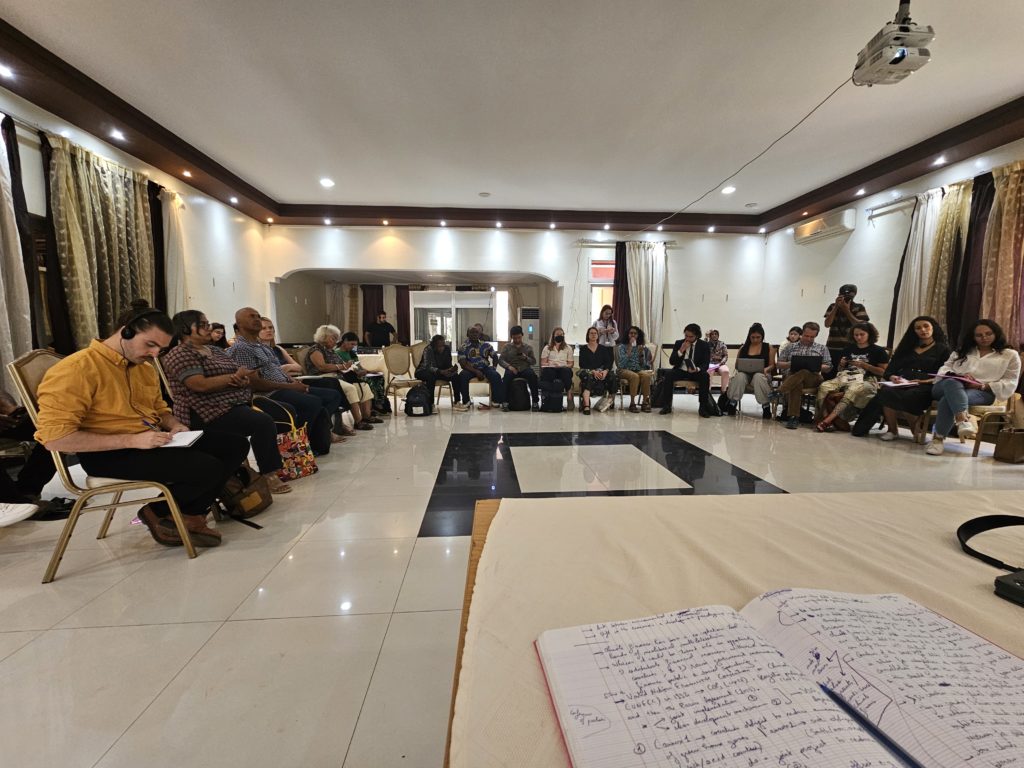
The Civil Society Town Hall Meeting with the President of the World Bank, Ajay Banga, and the CSO Roundtable with World Bank Executive Directors came across as excessively large talk shows or extravaganzas, making platforms for the Bank’s officials instead of civil society representatives. These events’ moderators had asked for questions to be submitted by CSOs ahead of the events, made their own selection of the questions that were put on the table during the events, allowed plenty of time for the Bank’s officials to respond and little-to-no time for CSOs to ask follow-up or – especially – new questions. As for the CSO Roundtable with IMF Executive Directors, while it was more contained in size and setting and apt to be productive, it lasted for a relatively short time. Given the number of topics that need to be discussed and the IMF officials’ defensiveness or dismissiveness of our approach and evidence, the discussion turned out to be superficial and non-fruitful.
More importantly, whether in the CSPF or in such events, it has been realized that the IFIs’ strategy not to really address our questions consists of ‘gas lighting’ and the use of buzz words. They speak about a shift away from austerity but still impose such measures on our governments; they use the words gender, inequality, and vulnerability but do not devise policies that are responsive to these dimensions; they speak about social spending floors, knowing that they are inadequate and not fit-to-purpose; they call simple tax as fair tax, targeted safety nets as social protection… In fact, they are co-opting our narratives. In some bilateral meetings with the IFIs’ officials, they sent us a signal that they feel that we are right on many aspects but that they cannot do anything about this. In such cases, we even received advices like “don’t call the social safety nets that we support ‘poverty-targeted’, you will lose you argument.” This shows that there is a serious lack of political will on the IFIs’ side to reconsider their approach and policies. As we mentioned to Meshkal, “[IMF and WBG] staff are restricted by their political mandates from higher-ups, including not only the president of the WB and [the managing director of the] IMF but also the institutions’ member States with the biggest voting shares.”
We understand this stalemate as a result of different intentions and expectations for CSOs versus the IFIs in relation to the objective of CSOs’ engagement in Annual and Spring Meetings. While CSOs see their participation as a mechanism to promote policy change, the IFIs seem to care about pretentiously adopting a participatory and consultative process. In their article, Meshkal refer to a recent Oxfam report on CSOs’ engagement with the IMF, which suggests that the IMF sees this process primarily as a “temperature check” on public perception of IMF programs. In other words, IFIs use these engagements to legitimize their actions. More so, Tunisian CSOs who participated in the virtual closed webinar[3] discussion organized by Oxfam in MENA and the Arab Watch Coalition (AWC), think that the IFIs even use such engagements to collect data on countries where they do not have access to data via official governmental channels, like in the case of Tunisia.
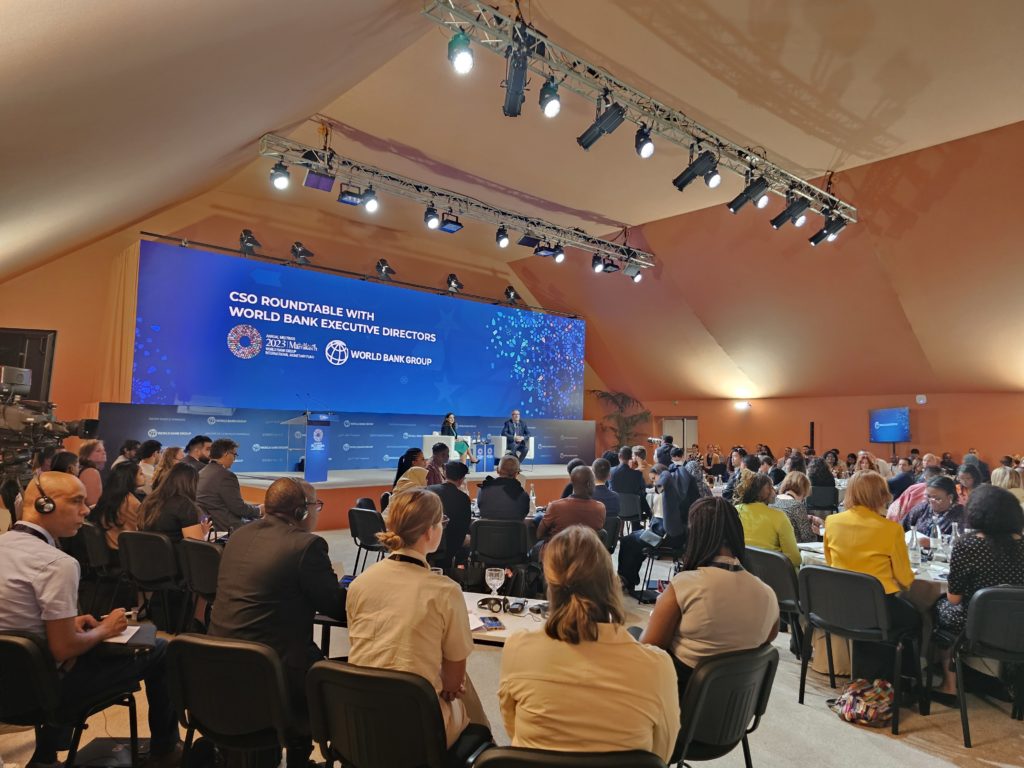
Subtle Censorship, Sidelining, and Supremacy
In previous meetings, including the Marrakech meetings, CSOs felt sidelined and somehow silenced. All CSO engagement events were contained in an isolated zone in the meeting’s campus, leaving CSOs unseen and active in their own bubble. Invitations to many roundtables with IFIs’ officials were either not extended to CSOs or only communicated to few of them. In some cases, a limit on the number of CSOs in attendance has been imposed. In “official events,” including ones with ministers and the press, CSOs were either fully denied access or allowed access as observers. This also applies to virtual or hybrid town halls such as the last high-level event[4] hosted by Kristalina Georgieva and Ajay Banga, where CSOs were only let in the back-end of the meeting room as observers (only allowed to leave masked questions in the chat box) whereas other participants were let in the front-end as ‘panelists’ (in the technical feature sense).
Moreover, the IMF Connect system hosting the Marrakech meetings’ schedules was not communicated properly to CSOs, and the latter’s events, including the CSPF, were absent from the show screens over the meetings’ campus. Even more, access to many CSOs’ websites, including ARI’s, was blocked through the meetings’ campus Wi-Fi; and video recordings of CSPF panels were neither shared with the respective organizers – despite many requests – nor published properly on YouTube. Instead, poor quality versions of these recordings were compiled in a window embedded in the middle of this page, forcing people to scroll to find their session. This cannot but be understood as an attempt to bury records and messages from these panels. Besides, the brown bag lunches and breakfasts with senior IMF and WBG staff that the IFIs’ CSO Team used to arrange for CSOs in previous meetings have been halted. Moving forward, the prognosis does not look promising either, since the size of the CSPF has been shrunk for the upcoming Spring Meetings as many panel session proposals have been rejected. Members of the Global Campaign for the Right to Social Security, solely, have submitted more than five panel proposals, out of which only one was accepted.
Furthermore, a condescending and belittling demeanor by IMF and WBG officials has been experienced by CSOs. “Evidence shows… Numbers say…” is what the latter have been often told while presenting their research, as if their work is not enough to be considered evidence, their numbers are invalid, and their qualitative findings do not matter. “I know my thing… I have been working at the Fund/Bank for long… I used to work at this ministry or that central bank…” was also common for CSOs to hear. In the Civil Society Town Hall Meeting with the IMF Managing Director, Kristalina Georgieva, she was sitting on stage with a ready-made speech while CSOs were lining up in a long queue, standing on the lower-level audience area, to ask her questions. As a result, many CSOs refused to join the queue as a matter of principle, while many others waited in the queue for long to eventually be unable to ask their questions because time was over. This is not to mention that the ready-made speech was, at any rate, not enough to really answer any substantive question.
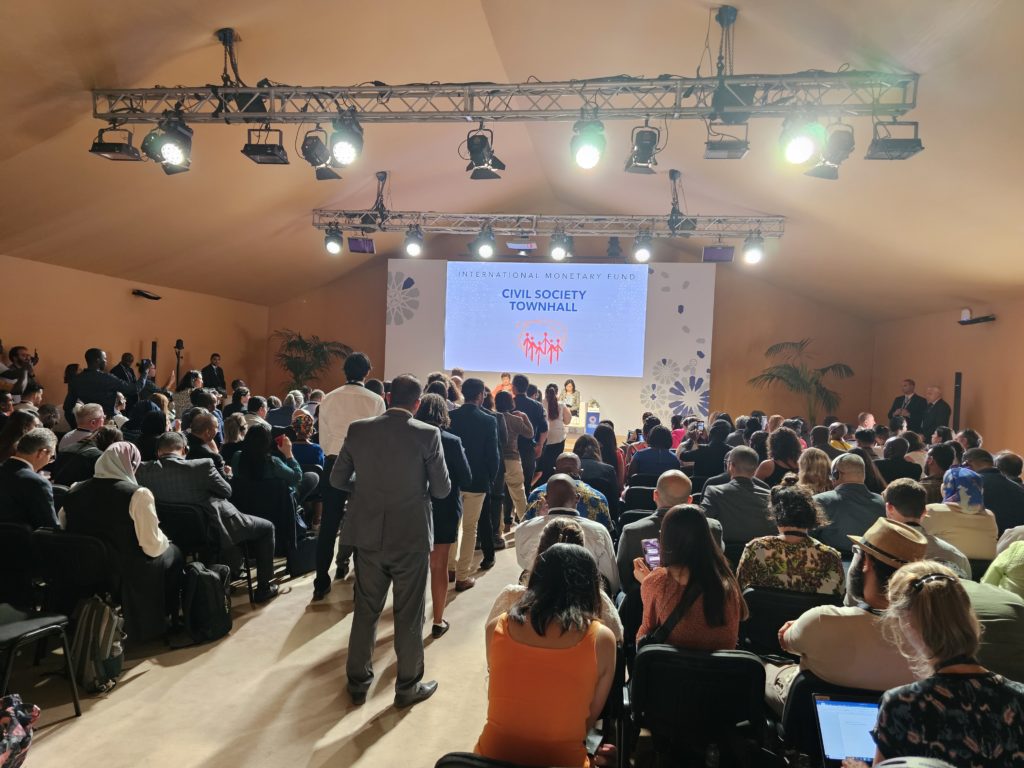
Unfulfilled Potential and Gaps to Bridge
Grosso modo, on top of all the challenges laid out above comes CSOs’ own challenges. For instance, civil society is not cohesive and ‘who really represents civil society?’ is always a key tension point. Accordingly, some messages by certain CSOs can be redlines for others. With the IFIs’ language being mainly English, many CSOs of the global South also face language barriers. Additionally, for many national CSOs, engaging with the IMF and/or World Bank is penalized in their country, which especially becomes troublesome when these IFIs’ include government officials in consultations involving CSOs… Overcoming the challenges that are external to CSOs is therefore key to allow them the space to deal with their many predicaments.
To that end, solutions begin with IMF/WBG-CSO engagement policies at national levels, which should be adopted by the IFIs and made mandatory for their staff. Developing such mechanisms in collaboration with CSOs, especially on a proper initial assessment of the civic space, is primarily important. Accountability mechanisms for CSOs’ use, as part of the IFIs consultation processes with them, should as well be put in place. CSOs should also keep their own records from their engagements with the IFIs, provide feedback to the Annual/Spring Meetings and the CSPF organizers, and follow-up tightly with the IFIs’ staff after these meetings. Even Nisreen Farhan, Chief of Public Affairs at the IMF, told Meshkal that feedback and follow-up are crucial and were found to make a difference.
Other solutions include – but are not limited to:
- Advocating with mid-level technical officers of the IMF and the WBG. The IFIs’ public affairs staff usually facilitate engagements with their colleagues at either too low or two high levels. It is usually either the country teams, whose job is mainly to ‘implement’, or the heads of the technical teams who can only engage in macro-level discussions. While approach-related discussions lie at the macro-level, they need to be deep and detailed to be fruitful.
- Ramping up bilateral meetings. One-on-one discussions have proven to be more profound, more productive, and vital to identify and bridge gaps between the IFIs and CSOs. For example, in one of the bilateral meetings we were involved in, we realized that there is a dire need to go back to concepts in our advocacy efforts, as the IMF and the WBG understand our call for ‘universal social protection’ as a call for ‘universal basic income’, while this is not the case and we do not recommend the latter as a reform. Moreover, of these meetings constituted an opportunity for us to benefit from some whistleblowing and access to insider information, which helped us discover our leverage point and get better clarity on the prospects.
- Intensifying media outreach and presence. In most previous meetings with the IFIs, we noticed that they fear big CSOs with high media visibility, as they fear the bad press. ‘Naming and shaming’ could be a way to further exert pressure as well.
- Different campaigns, especially global ones, should join forces on specific thematic areas. This will ensure a stronger lobbying power.
- Advocacy targeting IMF and WBG policies should also be undertaken through other IFIs and intergovernmental organizations, such as the EU (given its substantial voting shares), and – in some cases – governments, etc. Additionally, while it makes sense for related efforts to have a global or regional remit, public awareness raising about the impact of IMF and WBG policies on economies and societies are essential at national levels to create a worldwide demand-driven movement in this regard. Advocacy channels should be multilayered and diversified.
- Benefiting from consultations with the IFIs to collect data and understand the processes and negotiations happening between them and our governments. The IMF and the WBG collect information from us and should share information in return.
Above all, while it can be understood that the IFIs’ clients are their member States, IFIs should be true to their assessments. They publish the most remarkable reports on State capture in countries of the global South, but they still give government officials precedence over CSO representatives, cooperate, support and fund governments, and eventually legitimize these governments. The IMF and the WBG should rather be mindful that there is an active civil society that represents the people, needs to be heard, and is entitled to hold them accountable for their actions that can determine nations’ fates!
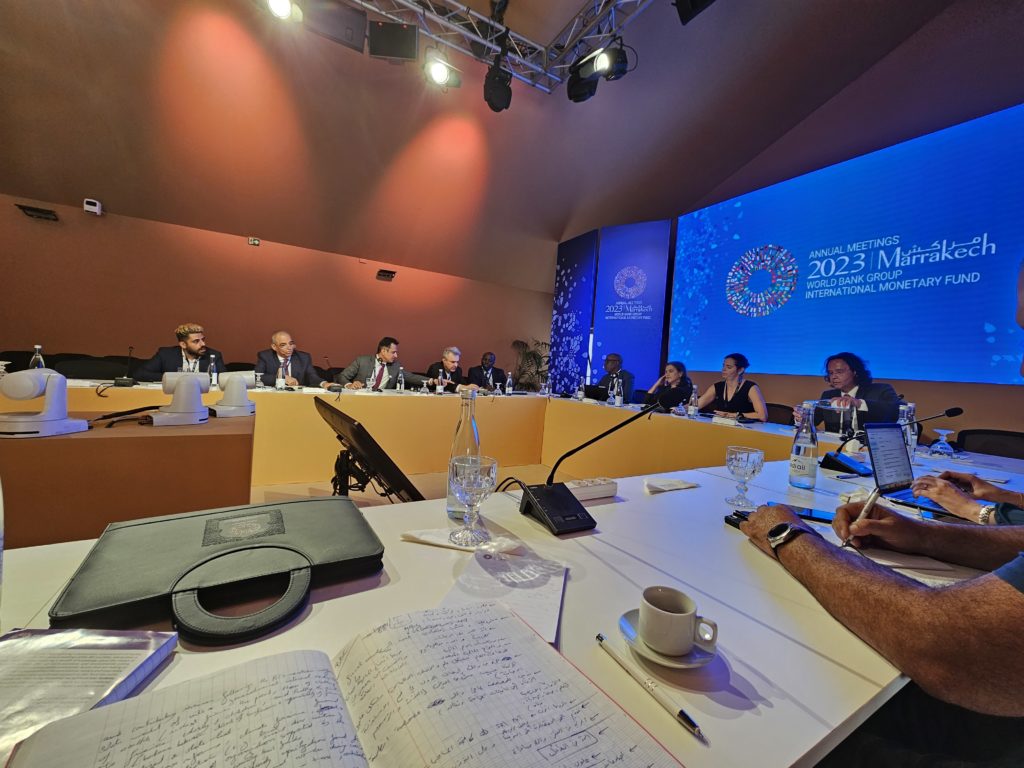
[1] In addition to informal bilateral exchanges, these mainly include a debriefing discussion on the Marrakech meetings amongst the members of the Global Campaign for the Right to Social Security, and a virtual closed webinar discussion organized by Oxfam in MENA and the Arab Watch Coalition (AWC) on the Annual Meetings and Spring Meetings process.
[2] As described by Sahar Mechmech, a public policy analyst at Ali Ben Ghedhahem Center for Fiscal Justice, for Meshkal: https://meshkal.org/imf-world-bank-civil-society-sidelined/.
[3] See footnote number 1.
[4] Held on April 3, 2024 and titled “Rising to the Challenge: Policy Action in Low-Income Countries and the Role of the International Community.”
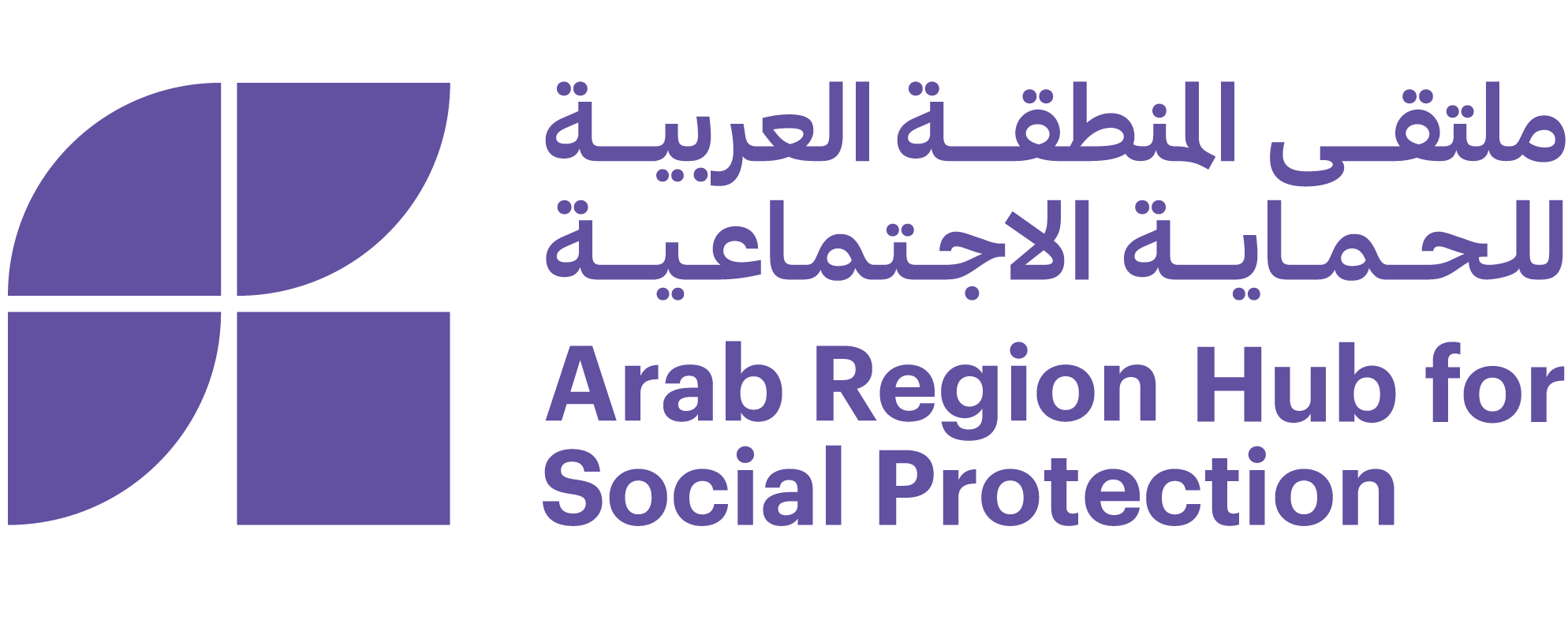
Comments are closed, but trackbacks and pingbacks are open.